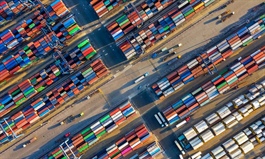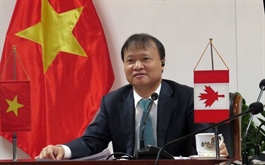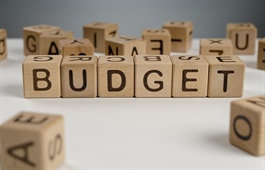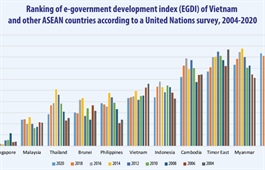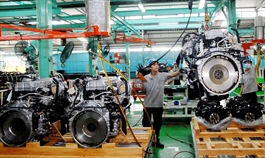Government sets 2021 “walk the talk” performance targets
Government sets 2021 “walk the talk” performance targets
The Government of Vietnam performed well in 2020, bringing the Covid-19 pandemic under control and achieving economic growth despite the crisis, and is now set to build on these achievements in 2021.
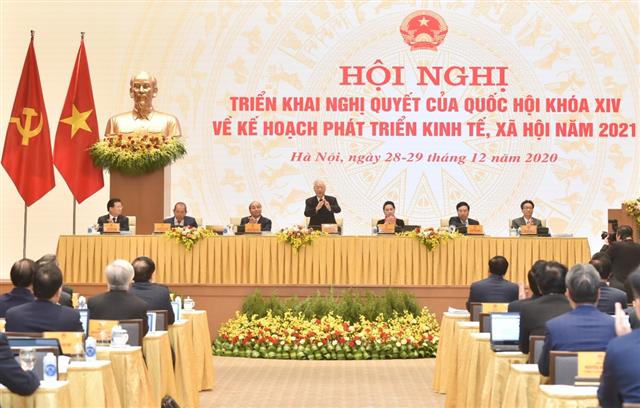
Party General Secretary Nguyen Phu Trong gave a speech at a conference on implementation of the 14th-tenure National Assembly’s resolution on socioeconomic development in 2021
|
Growth, restructuring, integration, digitization
The first target of its “walk the talk” guidelines for 2021 is the gross domestic product (GDP) growth and macroeconomic stability. Vietnam’s growth is forecast to be among the highest in the world, thanks to its successful containment of the Covid-19 pandemic, Era Dabla Norris, division chief in the International Monetary Fund’s (IMF) Asia and Pacific Department, said following her team’s virtual mission to Vietnam from October 15 to November 13.
The second guideline is accelerated economic restructuring to prepare for dealing with unprecedented changes and challenges. Vietnam has already overcome such challenges as the historic Mekong Delta drought and saltwater intrusion, described as one of the century’s worst, and efficiently contained the Covid-19 pandemic while maintaining economic growth and ensuring social security.
The third is that the government has ensured financial security, including reduction of public debt and government debt, and keeping total investment capital at 31-32 percent of the country’s GDP.
The fourth target is deeper international economic integration facilitated by major new generation trade and investment agreements to which Vietnam is a signatory. These include the Comprehensive and Progressive Agreement for Trans-Pacific Partnership (CPTPP), the EU-Vietnam Free Trade Agreement (EVFTA), the EU-Vietnam Investment Protection Agreement (EVIPA), and the Regional Comprehensive Economic Partnership (RCEP) agreement. Vietnam is not only a participant of international economic integration but also a leader of this process.
The fifth is digital transformation. Vietnam has become a digitalized, stable and prosperous country, a pioneer in testing new technologies and models. On June 3, 2020, Prime Minister Nguyen Xuan Phuc approved a national digital transformation program to 2025. The program has a dual purpose of both developing digital government, digital economy, digital society and establishing Vietnamese digital businesses with global capacity. Vietnamese enterprises are being urged to speed up digital transformation essential for growth.
US$5,000 per capita income
At a government meeting with localities on December 28 and 29, 2020, Prime Minister Phuc affirmed that in 2020, Vietnam achieved its dual goal of controlling the Covid-19 pandemic and maintaining economic growth.
As the global economy suffered the impacts of Covid-19, Vietnam was one of only a few countries to maintain economic growth, with GDP rising 2.91 percent. The economy has seen a number of bright signs, such as a record annual trade surplus of more than US$19 billion and 2,500 foreign-invested projects worth nearly US$15 billion. About 180,000 new companies were set up or resumed operations in 2020, up 0.9 percent from 2019. The disbursement of public investment posted the highest increase in the 2011-2020 period, more than 90 percent.
The country’s per capita income in 2020 was estimated at US$2,750, nearly 1.3 times higher than the US$$2,109 in 2015. Over the next five years, Vietnam will strive for a seven percent average GDP growth and a US$5,000 per capita income.
While the economy is growing fast, both income and gender inequality is well controlled. Vietnam has been internationally recognized for its achievements in gender equality, ranking 68th out of 166 countries in the Gender Development Index.
Vietnam is ranked among the top 10 countries best performing the fifth target of the UN’s Sustainable Development Goals on advancing gender equality and empowering women and girls.
Prime Minister Nguyen Xuan Phuc said the party and the state’s determination over the past 30 years has paid off and Vietnam is recognized by the world as a model of poverty reduction and an inspirational success story. The rate of households under the poverty line has decreased to 2.75 percent from 10 percent a decade ago.
Businesses - government’s first priority
Vietnam Chamber of Commerce and Industry (VCCI) Chair Vu Tien Loc repeated Prime Minister Nguyen Xuan Phuc’s request that local and national leaders prioritize handling the problems encountered by enterprises.
Investment environment improvement was a burning issue in the 2016-2021 period. During its tenure, the Government of Vietnam launched three major administrative reform campaigns. It abolished thousands of sub-licenses in 2016, abolished and simplified 50 percent of business conditions and administrative procedures in 2018, and in 2020, the government set targets to further reduce and simplify 20 percent more administrative regulations on business, and conducted an overall review to eliminate overlapping and problematic business regulations. Foreign economists have made encouraging assessments of Vietnam’s efficient efforts in business environment improvement.
In all, almost 4,000 business conditions have been removed or simplified and thousands of other regulations have been abolished to ease doing business and lower costs.
Many large-scale privately-owned investment projects were implemented and a large number of leading, efficient economic groups emerged during this tenure of the government. Vietnam nowadays encourages high-quality and high-tech foreign direct investment (FDI) projects. The total number of businesses in the country has increased 1.5 times over the past five years.
The Vietnamese Government recently issued two resolutions on major socioeconomic targets for 2021 and enhancing business environment and national competitiveness, on the heels of a successful 2020 despite the impacts of the Covid-19 pandemic.









